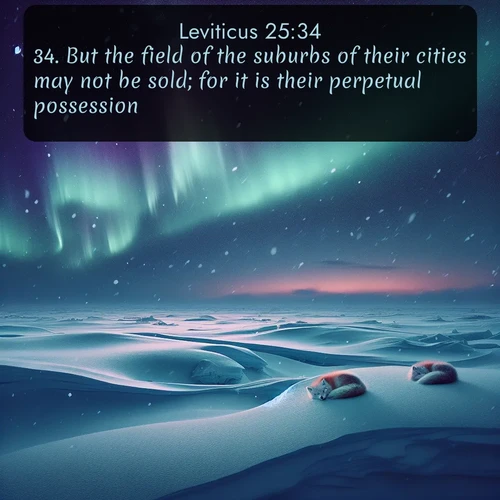Leviticus 25:34 plusieurs versions / traductions
English Bible Translations
34. But the field of the suburbs of their cities may not be sold; for it is their perpetual possession.
34. But the field of the suburbs of their cities may not be sold; for it is their perpetual possession.
34. But the land on the outskirts of their towns may not be exchanged for money, for it is their property for ever.
34. And the field of the suburbs of their cities shall not be sold; for it is their perpetual possession.
34. But the field of the suburbs of their cities may not be sold, for it is their perpetual possession.
34. And a field, a suburb of their cities, is not sold; for a possession age-during it [is] to them.
German Bible Translations
34. Aber das Feld vor ihren Städten soll man nicht verkaufen; denn das ist ihr Eigentum ewiglich.
34. und die Weideplätze bei ihren Städten dürfen nicht verkauft werden, denn sie sind ihr ewiges Eigentum.
French Bible Translations
34. Les champs situés autour des villes des Lévites ne pourront pas être vendus, car ils en ont la possession pour toujours.
34. Les champs situés autour des villes des Lévites ne pourront point se vendre; car ils en ont à perpétuité la possession.
34. Les champs situés autour des villes des Lévites ne pourront point se vendre; car ils en ont à perpétuité la possession.
34. Et les champs des banlieues de leurs villes ne seront pas vendus, car c'est leur possession à perpétuité.
34. Mais le champ des faubourgs de leurs villes ne sera point vendu; car c'[est] leur possession perpétuelle.
34. Les champs des faubourgs de leurs villes ne seront point vendus; car c'est leur propriété perpétuelle.
Versions with Strong Codes
Leviticus 25 / KJV_Strong34. But the field[H7704] of the suburbs[H4054] of their cities[H5892] may not[H3808] be sold;[H4376] for[H3588] it[H1931] is their perpetual[H5769] possession.[H272]
Strong Code definitions
H7704 sadeh saw-deh' or saday {saw-dah'-ee}; from an unused root meaning to spread out; a field (as flat):--country, field, ground, land, soil,X wild.
H4054 migrash mig-rawsh' also (in plural) feminine (Ezek. 27:28) migrashah{mig-raw-shaw'}; from H1644; a suburb (i.e. open country whither flocks are driven from pasture); hence, the area around a building, or the margin of the sea:--cast out, suburb.see H1644
H5892 `iyr eer or (in the plural) par {awr}; or ayar (Judges 10:4){aw-yar'}; from H5782 a city (a place guarded by waking or a watch) in the widest sense (even of a mere encampment or post):--Ai (from margin), city, court (from margin), town. see H5782
H3808 lo' lo or lowi {lo}; or loh (Deut. 3:11) {lo}; a primitive particle; not (the simple or abs. negation); by implication, no; often used with other particles (as follows):--X before, + or else, ere, + except, ig(-norant), much, less, nay, neither, never, no((-ne), -r, (-thing)), (X as though...,(can-), for) not (out of), of nought, otherwise, out of, + surely, + as truly as, + of a truth, + verily, for want, + whether, without.
H4376 makar maw-kar' a primitive root; to sell, literally (as merchandise, a daughter in marriage, into slavery), or figuratively (to surrender):--X at all, sell (away, -er, self).
H3588 kiy kee a primitive particle (the full form of the prepositional prefix) indicating causal relations of all kinds, antecedentor consequent; (by implication) very widely used as a relative conjunction or adverb (as below); often largely modified by other particles annexed:--and, + (forasmuch, inasmuch, where-)as, assured(-ly), + but, certainly, doubtless, + else, even, + except, for, how, (because, in, so, than) that, + nevertheless, now, rightly, seeing, since, surely, then, therefore, + (al- )though, + till, truly, + until, when,whether, while, whom, yea, yet.
H1931 huw' hoo of which the feminine (beyond the Pentateuch) is hiyw {he}; a primitive word, the third person pronoun singular, he (she or it); only expressed when emphatic or without a verb; also (intensively) self, or (especially with the article) the same; sometimes (as demonstrative) this or that; occasionally (instead of copula) as or are:--he, as for her, him(-self),it, the same, she (herself), such, that (...it), these, they, this, those, which (is), who.
H5769 `owlam o-lawm' or lolam {o-lawm'}; from H5956; properly, concealed, i.e. the vanishing point; generally, time out of mind (past or future),i.e. (practically) eternity; frequentatively, adverbial (especially with prepositional prefix) always:--alway(-s), ancient (time), any more, continuance, eternal, (for,(n-))ever(-lasting, -more, of old), lasting, long (time), (of) old (time), perpetual, at any time, (beginning of the) world (+ without end). Compare 5331, 5703.see H5956 see H5331 see H5703
H272 'achuzzah akh-ooz-zaw' feminine passive participle from H270; something seized, i.e. a possession (especially of land):--possession.see H270
Prédications qui analysent les thèmes Lévitique 25
Thèmes : Le jubilé; Les sabbats; L'héritage des terresRelated Sermons discussing Leviticus 25
Themes : Le jubilé; Les sabbats; L'héritage des terressee also: Bible Key Verses ; KJV Bible Images, BBE Bible images

